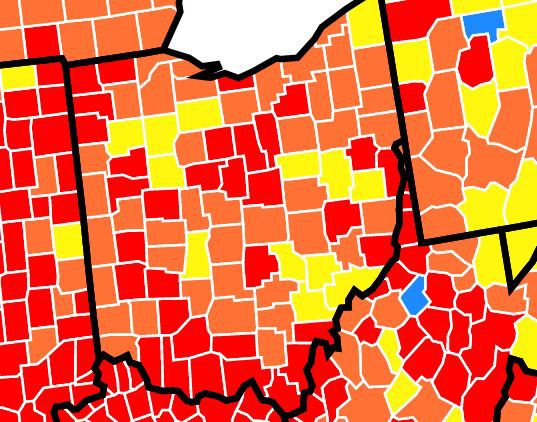OHIO — As hospitals report an increased number of patients flowing through their doors with COVID-19, Gov. Mike DeWine held a press conference Friday to urge Ohioans to get vaccinated.
"The name of the game is vaccines," DeWine said.
DeWine and Dr. Bruce Vanderhoff, the state health department's chief medical officer, warned the spike in cases and hospitalizations are being caused by the delta variant.
"Delta spreads like wildfire, and it seeks out anyone who’s not vaccinated," Vanderhoff said.
Vanderhoff said the delta variant is becoming the dominant strain in Ohio, a warning health officials have been sending for weeks.
On May 1, less than 1% of lab-sequenced cases involved the delta variant. Between July 4 to July 17, lab sequencing showed the delta variant was present in more than 86% of cases, Vanderhoff said.
“Experts tell me we are way above that number today," DeWine added.
Ohio documented 1,969 new cases Thursday, a slight dip from the more than 2,100 recorded Wednesday — which is the highest number of day-to-day cases reported since April.
According to the latest update from the Centers of Disease Control and Prevention (CDC) Thursday, 75 counties remain in the "high" or "substantial" level categories for COVID-19 spread. The CDC recommends residents in these counties to wear masks, regardless of vaccination status.

"They are all going in the wrong direction," DeWine said in reference to the counties.
Vanderhoff and DeWine said the vaccines are the strongest defense against delta, pointing to hospitalization data.
Since Jan. 1, there have been 18,662 COVID hospitalizations total. Of that group, 98.4% were not vaccinated, DeWine said.
“Please remember: This is not the common cold. This is a bad virus that can cause otherwise healthy children to develop a multisystem inflammatory condition and makes them very sick and puts them in the hospital for a very long time," Vanderhoff said. “Nearly all of that can be avoided by vaccination."
Vanderhoff explained the delta variant is much stronger, more contagious and gets people "sicker, quicker" than previous strains.
“People infected with the delta variant have a much [more] likelihood of being hospitalized," Vanderhoff said. "Delta is reproducing itself, creating more copies of itself much more quickly once it gets inside of our bodies."
Vanderhoff said vaccines can help prevent serious symptoms if one catches the delta variant, avoiding hospitalization.
"The data is very clear: All three of our vaccines remain very effective against the delta variant," Vanderhoff said.
DeWine said the recent spike in cases has also been accompanied by a jump in vaccinations, saying 85 of 88 counties increased their vaccination rate in July.
But still, DeWine said there's more work to be done to prevent the spread of the virus.
"The essential fact is that we have three vaccines that are highly, highly effective. They’re so powerful that we now live in a state with two groups of people: Those who are vaccinated and those who are not vaccinated," DeWine said.
As of the most recent state data, 60% of all adults 18 and older are vaccinated, and 40% of those adults are not. Of those 12 and older, 58% are vaccinated and 42% are not.
"The most amazing, the most remarkable, the most effective tool we have today is the vaccine," DeWine said.
In the last week, several Ohio hospitals have mandated employees to get vaccinated by the end of the year. Columbus Public Health and Franklin County Public Health officials issued an indoor mask advisory Thursday, urging everyone regardless of vaccinations to wear a face covering in businesses.
Summit County officials also urged residents to continue wearing masks, and earlier this week, Cuyahoga County officials decided they will mandate face masks inside government facilities.
